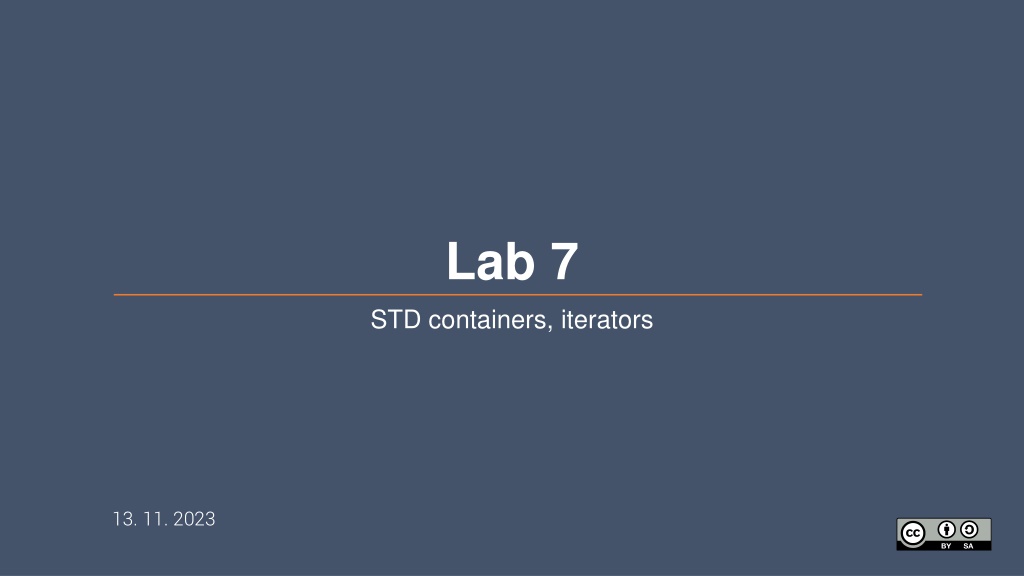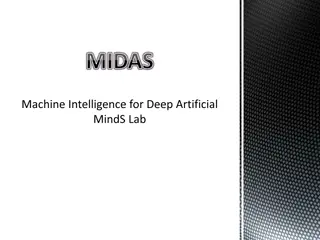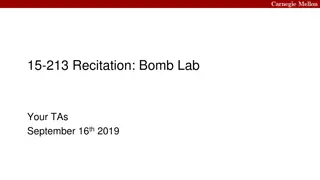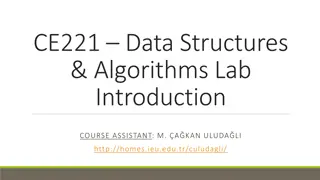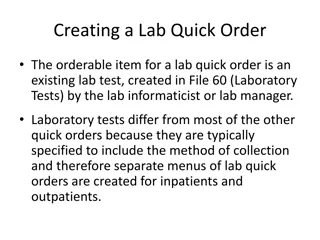Understanding STD Containers and Iterators in C++ Programming
In C++ programming, STD containers and iterators play a crucial role in managing data structures and traversal methods efficiently. By utilizing these tools effectively, programmers can enhance the performance and reliability of their code. This involves working with various container types, such as sequence containers and associative containers, and using iterators to navigate through elements. Additionally, best practices such as minimizing stream operations and avoiding unnecessary heap allocations are emphasized to optimize code quality and execution speed.
Download Presentation

Please find below an Image/Link to download the presentation.
The content on the website is provided AS IS for your information and personal use only. It may not be sold, licensed, or shared on other websites without obtaining consent from the author. Download presentation by click this link. If you encounter any issues during the download, it is possible that the publisher has removed the file from their server.
E N D
Presentation Transcript
Lab 7 STD containers, iterators 13. 11. 2023
Outline 1. Things from the previous labs and homeworks 2. STD containers 3. Iterators 4. Task 07 vector without invalidation 2023/2024 2 Programming in C++ (labs)
General things Problem with cmake not being in PATH If you install cmake and your terminal does not know anything about it Add the cmake bin directory to PATH (Windows) What do those weird lines in SIS mean? | - Completed and accepted / - Submitted, but it needs fixing - - Not submitted 2023/2024 4 Programming in C++ (labs)
Oveky? Minimise the number of operations with streams, they are slow Try to minimise number of operator+ on std::string, it creates new copy and copies from the operands use s.appen(str) for strings use s.push_back(c) for chars Use const on methods that do not modify the instance Use additional const in constexpr C constants constexpr const char* INPUT = ./somefile.txt ; Use size_t when size/number of semantics Use std::isalpha / std::isdigit instead of subtraction/ifs based on ASCII code value If possible, stay consistent with the naming pascalCase vs snake_case Try to avoid non-standard things, e.g. #pragma ... Try to avoid global variables Avoid unnecessary heap allocations, e.g. OveckyCounter cnt; on stack is perfectly fine 2023/2024 5 Programming in C++ (labs)
Overview of STD containers https://en.cppreference.com/w/cpp/container Sometimes they are called STL containers (Standard Template Library) STL naming was used more in the past Now it is STD containers library The element types need to be at least movable so you can put them into a container Categories Sequence containers (Ordered) Associative containers Unordered associative containers (since C++11) Container adaptors Provide a different interface for sequential containers The underlying container is specified as the second template parameter (usually, std::deque as default) STD containers always contain values. Container views (since C++20) non-owning views into the underlying data non-owning! 2023/2024 7 Programming in C++ (labs)
Sequence containers Sequence containers implement data structures which can be accessed sequentially. array (since C++11) elements stored directly inside the structure in contiguous memory the number of elements is known at compile-time vector elements stored in dynamically allocated contiguous memory reallocated when capacity is to be exceeded indexed with size_t modifying operations can invalidate iterators/pointers/references (always check the documentation) deque double-ended queue, push/pop_front/back elements may not be stored consecutively Does not invalidate iterators/pointers/references forward_list (since C++11) Singly-linked list, you can push/pop from the front or insert/erase after the given element (no pointers back) list Doubly-linked list, push/pop from both ends, insert/erase at any position (you must have iterator to it) 2023/2024 8 Programming in C++ (labs)
std::array elements stored directly inside the structure in contiguous memory the number of elements is known at compile-time // Declare and initialize a std::array of integers with size 5 std::array<int, 5> xs1({ 1, 2, 3, 4, 5 }); // Another way of direct initialization, since C++11 std::array<int, 5> xs2 = { 1, 2, 3, 4, 5 }; // Access elements using the operator[] for (int i = 0; i < xs1.size(); ++i) std::cout << xs1[i] << " "; Beware, that operator[] does no bounds checking -> potential UB If required, use xs1.at(i), this throws // Use iterators to traverse the array for (auto it = xs1.begin(); it != xs1.end(); ++it) std::cout << *it << " "; // Range-based for loop for a cleaner syntax for (const auto& element : xs1) std::cout << element << " "; // Access the front and back elements std::cout << "Front element: " << xs1.front() << std::endl; std::cout << "Back element: " << xs1.back() << std::endl; // Check if the array is empty std::cout << xs1.empty() << std::endl; 2023/2024 9 Programming in C++ (labs)
// Declare and initialize a std::vector of integers std::vector<size_t> xs1 = { 1, 2, 3, 4, 5 }; std::vector<size_t> xs2; // Set capacity to 10 xs2.reserve(10); // Initialize with 42, size is 10 std::vector<size_t> xs3(10, 42); std::vector elements stored in dynamically allocated contiguous memory reallocated when capacity is to be exceeded indexed with size_t modifying operations can invalidate iterators/pointers/references (always check the documentation) // Access elements using the [] operator for (size_t i = 0; i < xs1.size(); ++i) std::cout << xs1[i] << " "; // Use iterators to traverse the vector for (auto it = xs1.begin(); it != xs1.end(); ++it) std::cout << *it << " "; // Range-based for loop for a cleaner syntax for (const auto& element : xs1) std::cout << element << " "; // Access the front and back elements std::cout << "Front element: " << xs1.front() << std::endl; std::cout << "Back element: " << xs1.back() << std::endl; // Check if the vector is empty std::cout << xs1.empty() << std::endl; // Add an element to the back of the vector xs1.push_back(6); // Remove element from the back xs1.pop_back(); 2023/2024 10 Programming in C++ (labs)
std::deque // Declare and initialize a std::deque of integers std::deque<int> xs1 = { 1, 2, 3, 4, 5 }; std::deque<int> xs2; xs2.resize(10, 42); std::deque<int> xs3(10, 42); double-ended queue, push/pop_front/back elements may not be stored consecutively Does not invalidate iterators/pointers/references // Access elements using the [] operator xs1[2] = 10; // Use iterators to traverse the deque auto it = xs1.begin(); ++it; // Range-based for loop for a cleaner syntax for (const auto& element : xs1) std::cout << element; 0 1 2 3 // Access the front and back elements xs1.front() = 20; xs1.back() = 30; 4 5 6 7 // Check if the deque is empty bool isEmpty = xs1.empty(); // Add an element to the front and back of the deque xs1.push_front(40); xs1.push_back(50); fr to xs1.pop_back(); xs1.pop_front(); 2023/2024 11 Programming in C++ (labs)
std::forward_list, std::list // Declare and initialize a std::list of integers std::list<int> xs1 = {1, 2, 3, 4, 5}; forward_list (since C++11) Singly-linked list, you can push/pop from the front or insert/erase after the given element (no pointers back) list Doubly-linked list, push/pop from both ends, insert/erase at any position (you must have iterator to it) // Use iterators to traverse the list auto it = xs1.begin(); ++it; // Range-based for loop for a cleaner syntax for (const auto& element : xs1) { // ... // Insert an element after the second element xs1.insert(++xs1.begin(), 10); // Remove the third element xs1.erase(++(++xs1.begin())); // Check if the list is empty bool isEmpty = xs1.empty(); // Add an element to the front and back of the list xs1.push_front(20); xs1.push_back(30); xs1.pop_back(); xs1.pop_front(); 2023/2024 12 Programming in C++ (labs)
(Ordered) associative containers Associative containers implement sorted data structures that can be quickly searched (O(log n) complexity). You can iterate over them in their order But getting to the next/previous element is non-trivial (as opposed to sequence containers) The item type must have the It is used for comparison operator< implemented You can change this to alter the sorting in the structure set remember our BST tasks? But this is a balanced tree to guarantee log n search map Like a set, but there is also value associated with the key multiset Allows multiple keys that are equal with respect to operator< multimap Allows multiple pairs with equal keys 2023/2024 13 Programming in C++ (labs)
(Ordered) associative containers: Basic usage // Declare and initialize a std::map of key-value pairs (int to string) std::map<int, std::string> xs1({ {1, "One"}, {2, "Two"}, {3, "Three"} }); // Declare and initialize a std::set of integers std::set<int> xs1 = {3, 1, 4, 1, 5, 9, 2, 6, 5, 3}; // Check if an element exists in the set if (xs1.find(4) != xs1.end()) // ... // Iterate through the set using iterators for (const auto& element : xs1) // ... xs1.insert(std::pair(4, "Four")); xs1.emplace(5, "Five"); // Access elements using the [] operator std::string value = xs1[2]; // Insert an element into the set xs1.insert(7); // Check if a key exists in the map if (xs1.find(3) != xs1.end()) { // ... // Remove an element from the set xs1.erase(3); If not present, this will default-initialize this key! // Iterate through the map using iterators for (const auto& pair : xs1) { // ... 2023/2024 14 Programming in C++ (labs)
Unordered associative containers Unordered associative containers implement unsorted (hashed) data structures that can be quickly searched (O(1) average, O(n) worst-case complexity). You cannot iterate over items in any particular order The key element type must have operator== implemented and a hashing function that can generate a hash for the type must be provided The performance is dependent on the hash function unordered_set unordered_map unordered_multiset unordered_multimap 2023/2024 15 Programming in C++ (labs)
Unordered associative containers: Basic usage The same as with ordered ones... The iterators do not step in any specific order 2023/2024 16 Programming in C++ (labs)
Container adaptors Container adaptors provide a different interface for sequential containers. stack #include <stack> API push/pop interface top get the top item reference queue #include <queue> API push/pop interface priority_queue #include <queue> API push/pop interface top get the highest priority element By default implemented inside std::deque second template parameter const auto data = {1, 8, 5, 6, 3, 4, 0, 9, 7, 2}; // Max priority queue std::priority_queue<int> max_q; for (int n : data) max_q.push(n); // Min priority queue // std::greater<int> makes it min priority queue std::priority_queue<int, std::vector<int>, std::greater<int>> min_q(data.begin(), data.end()); 2023/2024 17 Programming in C++ (labs)
Container views since C++20 span string_view immutable non-owning view to std::string Non-owning! You must be sure, that the data it points to is still valid 2023/2024 18 Programming in C++ (labs)
Container iterators A logical reference to underlying element + operators Types: container<T>::iterator container<T>::const_iterator Getting iterators for containers xs.begin(), xs.cbegin(), xs.end(), xs.cend() xs.rbegin(), xs.crbegin(), xs.rend(), xs.crend() Accessing the target data Behaves like a pointer *it, it->x Moving the pointer ++it - at least forward iterator --it at least bidirectional it + K - random access by convention not implemented if this is not O(1) e.g. on binary search tree, you would not implement this Iterators have categories based on their capabilities: - forward - bidirectional - random access Further reading https://en.cppreference.com/w/cpp/iterator 2023/2024 20 Programming in C++ (labs)
Iterating over containers Explicit usage of iterators vector<int> pole; vector<int>::const_iterator i; for( i = pole.cbegin(); i != pole.cend(); ++i) cout << *i; map<string,int> mapa; for( auto&& x : mapa) cout << x.first << x.second; std::map stores std::pairs! structured bindings map<string,int> mapa; for( auto&& [key, value] : mapa) cout << key << value; vector<int> pole; for( auto i = pole.cbegin(); i != pole.cend(); ++i) cout << *i; auto for type deduction, saves your keyboard Beware of copy ! vector<int> pole; for( auto&& x : pole) cout << x; range-based for available only for the whole container for( auto x : pole) 2023/2024 21 Programming in C++ (labs)
Unified STD container interface Unified interface on all containers !! not all containers have all of these inserting push_back(V), push_front(V) emplace_back(par), emplace insert (V), (it, V) insert( it, it b, it e) insert( pair{K,V}) element access front(), back() operator[], at() no bounds check / with check (except) find(T) lower_bound, upper_bound others size(), empty() pop_front(), pop_back() nevrac hodnotu, jen odeb r ! erase(it), erase(it b, it e) clear() insert the element at the and/front - copy/move in-place construction of element (inside of the container) insert V, insert V in before *it insert of the interval from the other container [b, e) insert to map, key-value pair element from the front/back access the element - by index (seq) / key (assoc) find element by value/key find the first element of at least the value / find the last value of at most number of elements / emptiness remove from front/back deletes the element, or whole interval [b, e) clears the whole container ... and many many others cppreference.com 2023/2024 22 Programming in C++ (labs)
Complexities of operations insert/erase at i-th position access i-th element / element with key k push/pop at the front push/pop at the end push_front pop_front insert erase push_back pop_back begin() + i operator[], at(i) O(1) O(1) O(1) methods array O(n) O(n) O(1) (!) Amortised O(1) (*) O(1) vector O(1) O(1) deque Does not relocate elements once placed in. forward_list O(1) O(1) O(1) list (by key k) O(log n) (by key k) O(log n) sorted associative Only insert_after / erase_after unsorted associative Average O(1) Average O(1) If the capacity is to be exceeded, all elements are relocated! O(n) Worst-case scenario if not state otherwise! 2023/2024 23 Programming in C++ (labs)
Inserting elements save some time class MyClass { MyClass( X x, Y y); MyClass(const MyClass(MyClass&& other) noexcept; MyClass& operator=(const MyClass& other); MyClass& operator=(MyClass&& other) noexcept; ~MyClass() noexcept; }; Typical set of special members MyClass& other); push emplace what is called ctor, copy_ctor, dctor v.push_back( m) v.emplace_back( m) ctor, move_ctor, dtor v.push_back( move( m)) v.push_back( MyClass{x,y}) v.emplace_back( move( m)) v.emplace_back( MyClass{x,y}) v.emplace_back( x,y) ctor If possible, use the last option! 2023/2024 24 Programming in C++ (labs)
Beware! capacity vs size | reserve vs resize The size preallocated for elements -> .capacity() If is filled, we need to reallocate Current number of elements in the container -> .size() // Default-constructed, does not (yet) allocate std::vector<size_t> xs1; // capacity 0, size 0 // Increasing just capacity xs1.reserve(4); // capacity 4, size 0 xs1[0]; // UB! Out of bounds // Increasing capacity & default-inserting elements xs1.resize(5); // capacity >= 5, size 5 xs1[4]; // OK, but garbage // Slicing to first `n` elements xs1.resize(2); // capacity >= 5, size 2 xs1[4]; // UB! Out of bounds allocated space: capacity() reserve() number of elements: size() resize() // Initialize with the given size and value std::vector<size_t> xs2(3, 42); // capacity 3, size 3 xs2[3]; // OK, 42 2023/2024 25 Programming in C++ (labs)
Containers: sorting #include <vector> #include <algorithm> string s; set<string> v; for(;;) { cin >> s; if( cin.fail()) break; v.insert(s); } string s; vector<string> v; for(;;) { cin >> s; if( cin.fail()) break; v.push_back(s); } sort( v.begin(),v.end()); How to sort by length and not lexicographically? Two problems want to sort based on other properties e.g. sort strings by their length aggregate types do not have < defined structs, classes, Solution -> provide custom comparator operator< external comparator- function / functor / lambda 2023/2024 26 Programming in C++ (labs)
Containers: sorting by internal operator< Internal structure comparator operator< works with sort functions and sorting containers only one, cannot have more cannot implement for fundamental types struct T { string s; int i; bool operator<( const T& y) const { return i<y.i || (i == y.i && s<y.s); } }; overload < operator set<T> v; v.insert( T {"jedna", 1}); external comparator - function can have many of these cannot pass as a template parameter template parameter must be a type, not function bool mysort( const string& s1, const string& s2) { return s1.size() < s2.size() ? true : (s2.size() < s1.size() ? false : s1<s2); } vector<string> v; sort( v.begin(),v.end(), mysort); set<string,mysort> m; 2023/2024 27 Programming in C++ (labs)
Containers: sorting with external functor or lambda external comparator - functor can have many, general solution bit more complex struct T { string s; int i; }; functor struct cmp { bool operator()( const T& x, const T& y) const { return x.i<y.i || .....; } }; functor class with operator() overloaded objects can be called as functions cmp x; x(t1,t2); set<T, cmp> v; v.insert( T{"jedna", 1}); Type of lambda, auto must be used extern kompar tor - lambda shorter syntax, just syntax sugar for functors weird syntax cannot use in a class declaration auto cmp = [](const T& s1, const T& s2) { return .. }; set< T, decltype(cmp)> v; Compiller wil fill in the type of variable cmp 2023/2024 28 Programming in C++ (labs)
Some common mistakes to avoid with containers Compose the containers wisely int main() { vector<tuple<string,string,string,string,string>> dict; for(auto& x : dict) .... } Think about performance a little for( x = dict[slovo].begin(); x < dict[slovo].end(); ++x) { if( dict[slovo].xxx < dict[slovo].yyy) .... } Compiler CANNOT optimize this, each expression must be re- evaluated. Why? Do not rely on any platform-specific things Only on what the standard says! Watch for UBs, so that the code runs on your machine without errors doesn t mean that there are no UBs Things like stack corruption, accessing invalid memory, ... 2023/2024 29 Programming in C++ (labs)
Task 7 vector with persistent item positions & custom iterators Implement a vector-like container for `size_t` that guarantees that the elements are never reallocated Thus, the address/pointer/iterator to it is never invalidated Implement it like a linked list of fixed-size arrays Implement a custom forward iterator over this container For now, implement only these operations push_back pop_back operator[] 0 1 2 3 4 5 6 7 fr to Implement iterators so that I can write for (auto& x : xs) std::cout << x << endl; This is roughly how std::deque is implemented 2023/2024 31 Programming in C++ (labs)
Lab 7 wrap up You should know Next lab: Your tasks until the next lab: Task 7 (24h before, so I can give feedback). Just a directory lab_05 with one CPP file will do ReCodex assignment 2 simple people database 2023/2024 33 Programming in C++ (labs)
